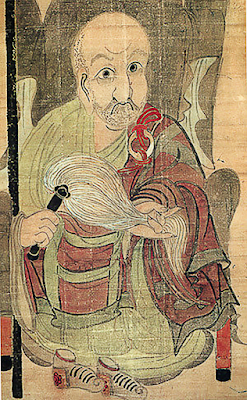The Fireplace Records, Chapter 10
One afternoon, Master Hakuin said "I once read that Master Gaofeng Yuanmiao preached that there are three requirements for the study of Zen. The first is a great root of faith. The second is a great ball of doubt. The third is a great tenacity of purpose. A man who lacks any of these is like a three-legged kettle with one broken leg."
Layman Mujiang, replied to Hakuin saying, "There are always more than three."
Hakuin asked "More?"
Mujiang said, "How about being able to sit still quietly for many hours?"
Hakuin said, "I doubt it."
Mujiang said, "How about reciting the sacred scripture or Names more?"
Hakuin said, "I doubt it."
Mujian said, "You will never give up the quest for Buddhahood, will you Master Hakuin."
Hakuin said, "I doubt it."
Layman Mujiang's Verse:
Grab hold of the Koan by one of its Three Limbs:
Have faith in the Buddha's Hands;
Heal the bruises of Doubts;
Hold on tightly, keep your grip, Persist.
The Three gives birth to the Ten Thousand Things.
Somehow/someway changing by profound and decent ways.
Doubts hinder many and spur a few to act.
Plant the great Root of Faith deep in good soil. Water it daily.
Big Doubts, little doubts, Great Doubts, minor doubts.
I don't know, doubting it, maybe so, hypothetical, provisional.
I can't see the Big Harbor because of the dense fogs.
I doubt the fog will lift this morning.
Japanese Zen Master Hakuin Ekaku (1868-1769) was extremely influential in reviving the practice of using koans/mondos/verbal encounters/stories in his Rinzai Zen Buddhist training program and with his priestly work with rural workers. He stresses the direct interaction between a master koan teacher and a koan student, face to face dialogues, regular one on one testing, interaction, and evaluation.
Hakuin Ekaku was an accomplished artist and calligrapher. He also emphasized good fitness and health practices to prepare the body for the rigors of Zen training.
Hakuin believed that quiet sitting or simple daily activities combined with the contemplation of koans was a very effective practice for imparting Buddhist wisdom teachings (Dharma) and inducing enlightenment.
Hakuin thought about and he experienced personal realization, or kensho, or satori, or enlightenment, or interpenetration of suchness at the intersection of the Fundamental Point, or fully understood his authentic changing selfhood by using koan practice while sitting or gently moving.
You can Contemplate your Assigned Koan: absorb it, mull over it, get frustrated by it, doubt it, think about it, meditate on it, discard it, cuss it, sink into it, respect it, analyze it, confound it, introspect it, leap over it, word tail it, kick it around, not-think it, hear its messages, swallow it and spit it out, submerge with it, cherish it and hate it, study it diligently, become one with it, keep it first in mind, squeeze all the insight from it, be surprised and amazed by it, catch it with a capping phrase, reflect on it, huatou keypoint at it, laugh at it, reflect on it, cry over it, stop analyzing it, grab it by the throat, don't let it go.
Persist in Contemplating your Assigned Koan until your deeper intuitive understanding occurs, or you are somehow/someway changed in profound and decent ways, or you have chosen to work/study another koan, or you just try and try again like a dog begging for extra treats, or you somehow/someway graduate to a new awareness of our precious lives, or you quit doing koan practice, or ...
You might find that "something should take place not unlike the cat springing upon the mouse or the mother hen hatching her eggs, then in a flash great livingness surges up. This is the moment when the phoenix escapes from the golden net, when the crane breaks the bars of its cage."
- Ruth Fuller Sasaki, The Zen Koan, 1965, p. 42
Cloud Dragon: The Joan Sutherland Dharma Works
Joan Sutherland Koan Collections
Gates: Miscellaneous Koans Joan Sutherland
Gateless Gateway Joan Sutherland
The Blue Cliff Record Joan Sutherland and John Tarrant
"Sometimes our practice is something like this. We don’t know how much our understanding is limited. That is why you have to study koans. Koans will open up your mind. If you understand your way of life more objectively, you will understand what you are doing."
- Suzuki Roshi
Hakuin, Self-Portrait, 1767
He gently touches his ceremonial whisk;
he frowns, he seems displeased
about something or someone.
Maybe his stomach is upset.
Maybe that great ball of doubt
is stuck in his soul.
Pulling Onions Over 1,043 One-line Sayings by Mike Garofalo
Chinese Chan Buddhist and Taoist Stories and Koans
Fireplaces, Stoves, Campfires, Kitchens, Pots, Firewood
Bibliography, Quotations, Notes, Resources
Compiled by Michael P. Garofalo



No comments:
Post a Comment